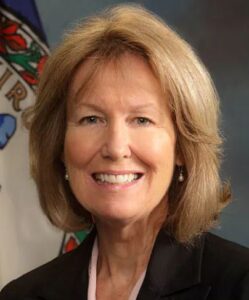by James A. Bacon
Once upon a time, Virginia built roads and bridges according to the quaint old principle of “pay as you go,” meaning that the state didn’t spend money it didn’t have. That idea went hand in glove with another quaint concept that the people who used public transportation infrastructure should be the people who paid to build and maintain it. People who walked (which a lot of people did in those days) or rode the trolleys shouldn’t pay for roads.
Now Virginians are much more sophisticated. We tell ourselves that such antiquated ideas originated with Harry Byrd Sr., who was a segregationist and racist, which therefore discredits everything he said and did. Not only do modern-day Virginians borrow billions of dollars to build transportation projects, government now operates bus, passenger rail and commuter rail lines, and we tax everyone to pay for everything. The link between who use and those who pays for transportation infrastructure has dissolved like a corpse in a vat of hydrochloric acid.
Virginia’s original bus lines, trolley lines, and passenger lines once operated for profit. They no longer do. The government owns them and massively subsidizes them — even more than roads and highways (which is a travesty in itself). But apparently those subsidies are not enough. Now the au courant thinking is that subsidized transit fares are a “barrier.” People who ride mass transit should not have to pay anything at all.
Thus, The Washington Post brings up the topic of transportation “equity” in an interview with Secretary of Transportation Shannon Valentine. Here is part of what she says:
COVID has shone a bright light on just how fundamental public transportation is to connecting people to essential work and food and medicine. It is truly vital. … Some of our transit systems in Virginia had initiated fare-free options. What we’ve learned is that fares are and can be a barrier, so we’re developing pilots around Virginia to work with fare-free so we can expand that and see how we could address that particular barrier. The Transit Ridership Incentive Program that came out of the omnibus bill that passed in 2020 is looking at all the barriers, as well as the design of our routes and how we can better create that accessibility for all people, and in particular those who are underserved. We’re working very hard to do that.
And that’s how transportation become subsumed into the welfare state. Mass transit serving poor people is becoming another entitlement.
Needless to say, no one is talking about “equity” in regards to automobile ownership. No one complains how the the price of automobiles is a “barrier” to driving cars. Alternatively, no one is talking about expanding private-sector ride-sharing vans operated by the likes of Uber and Lyft.
Look beneath the surface, and you’ll see what is happening. White environmentalists like mass transit because buses and trains get people out of cars and, in theory (if not necessarily in reality) produce fewer CO2 emissions, thus advancing the war on global warming. But the public isn’t nearly as worried as white environmentalists are that the planet is over-heating and posing an existential threat. Shrewdly, mass transit advocates are re-casting their environmental wish lists to address “equity” and “environmental racism.” Same goals — decarbonizing the economy — but a new justification. In the era of Black Lives Matter, “equity” gets a lot more political mileage than “sustainability.”
Woke environmentalists show remarkable creativity in finding “equity” justifications for things that they wanted all along and a remarkable indifference toward achieving “equity” by means that don’t advance their environmental goals.
So, rest assured that Virginia’s transportation future will involve a lot more borrowed “free money” from Uncle Sam, as much debt as the commonwealth can absorb, and a lot of taxing Peter to pay Paul. Everything will be just dandy until the wheels fall off the spend-borrow-and-monetize-the-debt bus, as inevitably it will. Then things will go back to “pay as you go” because, when public debt markets collapse, that will be the only way to pay for anything.



